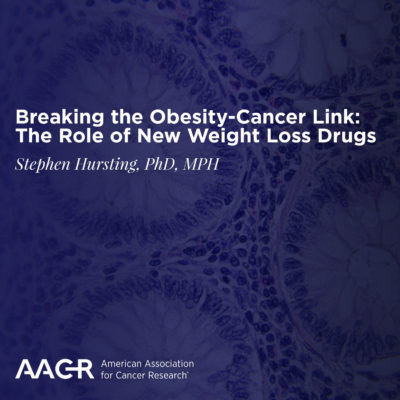The annual American Association of Cancer Research (AACR) meeting took place April 5-10 in San Diego. It is the focal point of the cancer research community, where scientists, clinicians, other health care professionals, survivors, patients, and advocates gather to share the latest advances in cancer science and medicine. Stephen Hursting, PhD, MPH, was one of the featured speakers at this year’s event.
By: Fred Gebhart
The worldwide epidemic of obesity, a risk and progression factor for at least 15 types of cancer, presents a global health threat, and effective strategies to mitigate this threat are needed. Incretin therapies can induce weight loss comparable to bariatric surgery, but the anticancer benefits and possible risks of these drugs are not clear. This session will provide preclinical and clinical evidence regarding the potential of current and emerging incretin mimetics to reduce the impact of obesity on cancer, as well as the latest evidence on safety concerns regarding thyroid and pancreatic cancer.
Session Chair Stephen D. Hursting, PhD, MPH, Professor in UNC’s Department of Nutrition, UNC Nutrition Research Institute, and Lineberger Comprehensive Cancer Center, said there seems to be immune-enhancing effects with incretin mimetics in addition to their weight loss effects.
“Cytotoxic T cells that surveil and kill tumor cells display glucagon-like protein (GLP)-1 receptor up-regulation when they are activated. We have found that tirzepatide, which is a dual GLP-1 and GIP receptor agonist, may push those cancer-killing T cells to be more effective. We also showed that ablating the cytotoxic T cells reduces the anticancer effects of tirzepatide, suggesting there is an important interaction between incretin mimetics and antitumor immune responses.”
Hursting pointed out that incretin mimetics might not be for everyone, but for many people they can provide a weight-loss option when lifestyle changes alone are not sufficient. “Incretin mimetics are a game changer in the weight loss field, and our initial data suggests they have great potential to reduce the adverse impact of obesity on cancer risk and outcomes. However, there are many unanswered questions regarding these drugs in the context of cancer prevention or treatment. For example, what cancer types respond to these drugs? How do incretin mimetics interact with chemotherapy or immunotherapy? Do these drugs need to be taken forever, or can diet and exercise sustain the anticancer benefits achieved by the drug-induced weight loss? I hope this session stimulates new research to begin to address the promise and many unknowns regarding incretin mimetics and obesity-related cancers.”

